Protect Your Online Store: Top E-Commerce Security Strategies Every Business Should Know
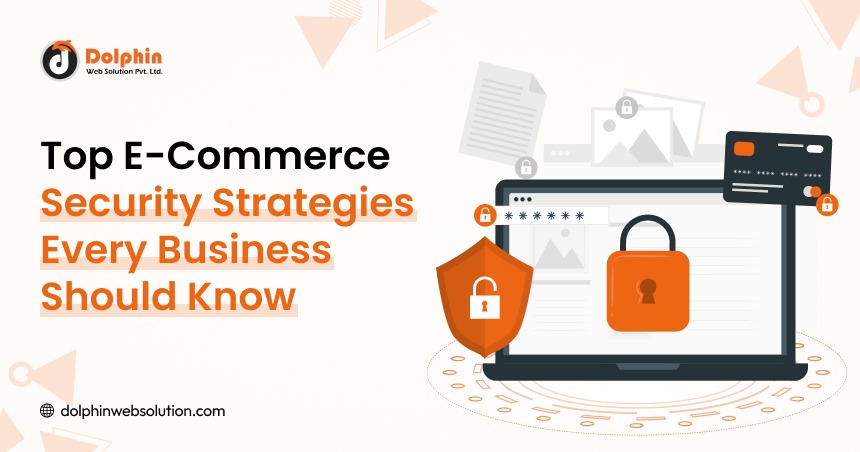
Table of Contents
Summary :
Cyber attacks are growing rapidly nowadays, especially in the eCommerce industry, where stealing customers' data and card details is risky. It's essential for eCommerce businesses to protect their brands from cyberattacks. This guide covers the most useful security strategies to protect your online store.
For eCommerce businesses, security is one of the biggest considerations. Their whole business is bringing revenue digitally, and it must be protected. This is especially true in today’s digitalization, where cyber-attacks are rapidly increasing, especially in eCommerce.
According to the stats, eCommerce fraud is expected to increase from $44.3 billion in 2024 to $107 billion in 2029, a growth of 141%. This clearly shows how fast fraud is happening and why every e-commerce business must protect itself from such cyber attacks.
These cyber-attacks steal not just money but sensitive customer data and damage brand reputation. So make sure to take all the necessary precautions to protect your business.
However, many companies don’t know how to safeguard their eCommerce businesses. Don’t worry!
In this article, we’ll explore the ten essential security strategies that every eCommerce business should implement to protect itself from cyberattacks.
So, without any further delay, let’s dive in!
Top E-Commerce Security Strategies Every Business Should Know
Here are the top eCommerce security strategies that you need to know:
1. Understand the Different Types of Cybersecurity Threats
Every eCommerce business needs to be aware of various cyber security threats to protect the online store. Here are some of the most common threats you need to know:
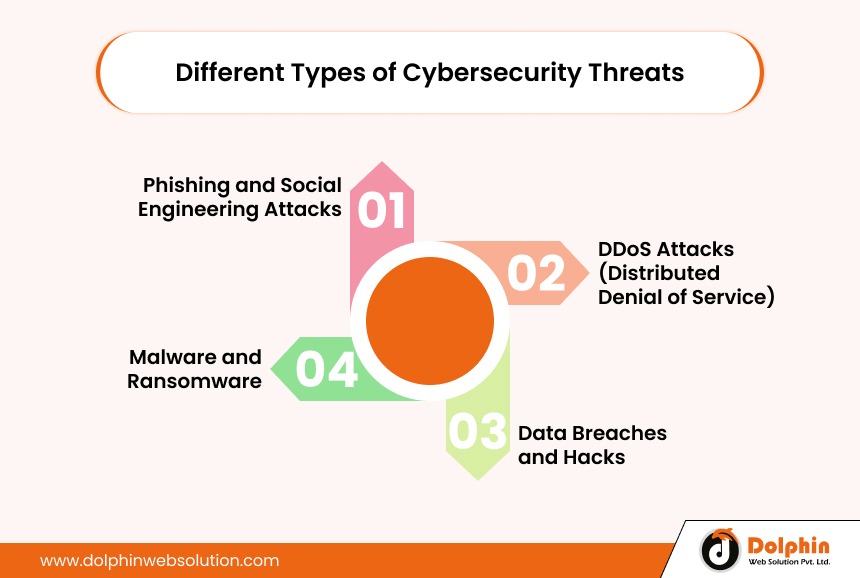
- Phishing and Social Engineering Attacks: One of the most common attacks is phishing, in which hackers trick customers or store owners into revealing sensitive information like login details, payment details, and credit card details by pretending to be a trusted source.
- DDoS Attacks (Distributed Denial of Service): In a DDoS attack, hackers send a huge amount of fake traffic to a website to overload it and crash it, preventing customers from shopping.
- Data Breaches and Hacks: When a hacker gets into an online store’s system, they can steal information like customer details and payment details, which refers to data breaches.
- Malware and Ransomware: Malware is a harmful attack that can slow down your site, steal all data, and ask for money in exchange for unlocking the website or data.
What Are the Best E-Commerce Security Strategies
1. Implement SSL/TLS Encryption for Safe Transactions
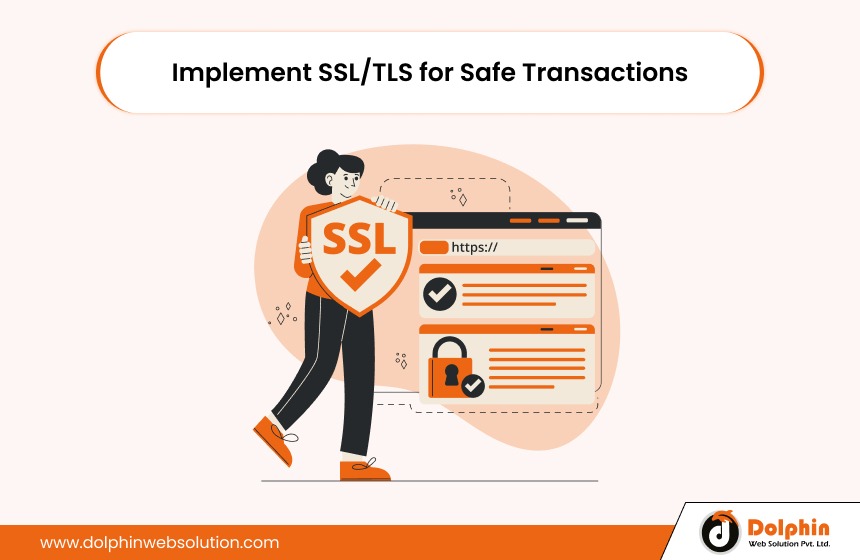
SSL (Secure Sockets Layer) and TLS (Transport Layer Security) are both security protocols that encrypt the information sent between your website and customers. This means that all the sensitive data stored on the website can be encrypted by implementing SSL/TLS. So that hackers can’t read or steal it. Many people confuse HTTP and HTTP; the “S” stands for secure, meaning the HTTPS website is more secure than HTTP and makes the site encrypted. To obtain SSL/TLS encryption, you need to get an SSL certificate on your website’s server, which your hosting provider offers and sets up.
2. Use Strong Authentication Mechanisms
Another essential strategy for D2C eCommerce websites is using strong authentication mechanics, Which adds an extra layer of security more than a password to access your admin account. It can be a code sent to your phone for additional verification. But you must keep your password strong with a mix of letters, numbers, and symbols and change it regularly. Plus, role-based access is another useful add-on of the security layer that limits only the right person from accessing the online store.
3. Secure Your Payment Gateway and Payment Information
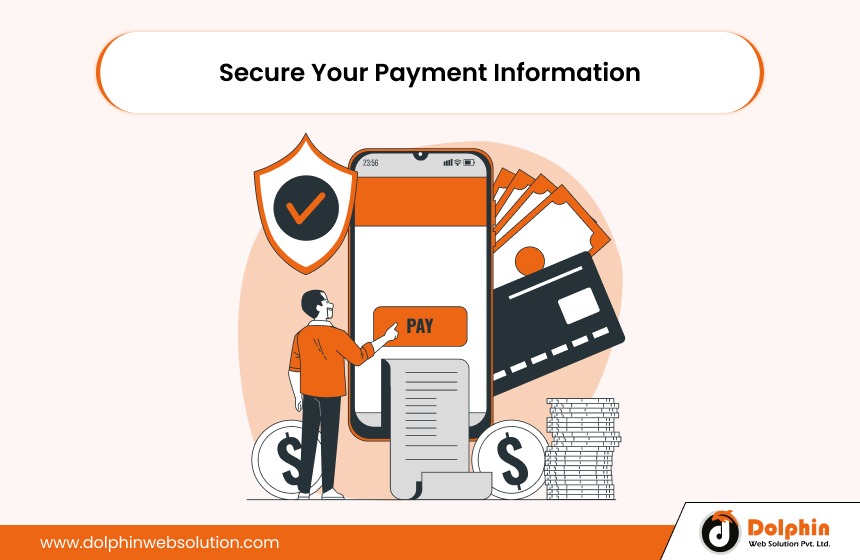
The payment gateway is one of the crucial parts of your online store, where customers share sensitive bank details or card details to make purchases. So, keep the payment gateway and information encrypted and secure from hackers. You can use best practices like tokenization and encryption to keep the payment details safe. Choose a trusted payment gateway provider that follows all the security standards. Plus, make sure the payment gateway meets the PCI-DSS compliance requirements, which ensure that your store handles credit card information safely and protects customers’ data.
4. Regular Software and Platform Updates
Another essential strategy to keep your online store protected is regular software and platform updates to ensure security. Sometimes, using outdated software and platforms can create loopholes for hackers to break security and create security risks. So, do automated updates whenever possible and test everything to ensure everything works fine and avoid any issues.
5. Backup Your Store Data Regularly
Data backup is an essential part of protecting your store from heavy loss. Sometimes, cyber-attacks are so strong that they damage the whole online store, and all the data is lost forever. In such conditions, if you’ve already backed up data, you can quickly restore it to your online store. There are various plugins available that can help you quickly back up data. Additionally, you can keep a copy of your backup in a separate location to ensure a Plan B if Plan A fails. You can outsource to the best ecommerce development companies to backup your online store data in the cloud or on a physical drive. Plus, various eCommerce hosting providers also offer auto backup options.
6. Employ Website Security Tools and Firewalls
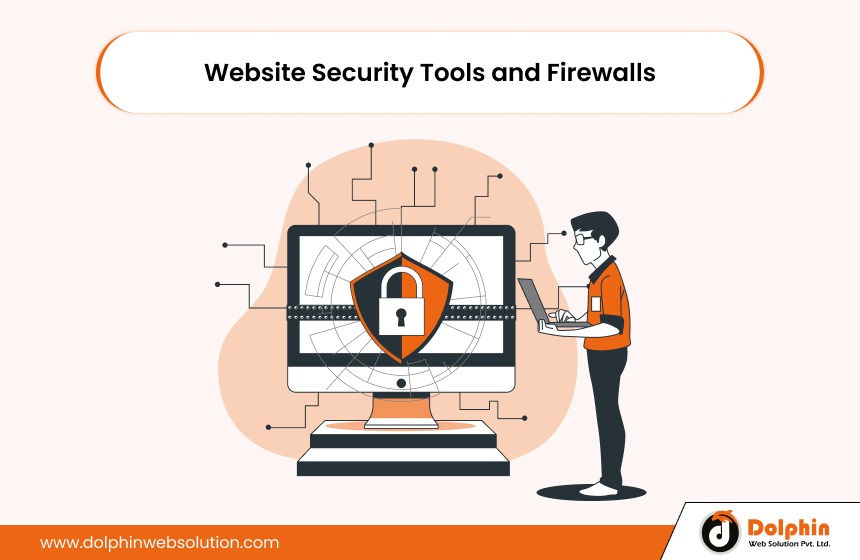
You can use website security tools and firewalls to protect your online store. A Web Application Firewall (WAF) is one of the helpful tools that can block common attacks like hacking attempts and malicious traffic by monitoring and filtering incoming data to your online store. Plus, using anti-malware and security software can help prevent your site from being infected by malicious programs. You can use Intrusion Detection Systems (IDS) to watch for any suspicious activity on your online store and take necessary action to protect your store.
7. Educate Your Team on Security Best Practices
Many businesses make this mistake and need to educate their team members to follow the security practices in their company. So, educating your team members on security best practices and creating a security-aware culture is very important. You can train your employees regularly and run training sessions to help them recognize threats and necessary actions to take. You need to teach them how to spot the threats, tackle them, and protect the online store from hackers.
8. Perform Regular Security Audits and Vulnerability Testing
One of the proven eCommerce strategies to protect your online store from cyberattacks is performing regular security audits and vulnerability testing in your online store. It’s one of the essential tasks you often need to do when running penetration and vulnerability tests. These tests will help you discover security flaws that you must fix to protect your online store. There are numerous security tools available that you can use to keep track of your whole site, spot it, and fix it to prevent extensive damage.
9. Have a Disaster Recovery Plan in Place
Every business must have a disaster recovery plan in case of a crisis like a data breach or cyberattack. You need to create a plan that outlines the exact steps to take if your site is attacked, like restoring data and securing your online store. You must also have clear communication platforms to inform your customers if their information is affected and ensure they know what steps to take further.
Conclusion
Security must be the backbone of every eCommerce business when running an online store. Because one critical cyber attack can break your whole business, so make sure to invest in security to protect your eCommerce business from potential attacks. Hopefully, this guide will help you know the useful strategies you can implement to protect your online store from cyber attacks and run your business safely. However, implementing these security measurements is a technical task. For this, you can hire ecommerce developers to let the professionals handle your online store security measurement and secure your online store.

Hello!
Click one of our contacts below to chat on WhatsApp

